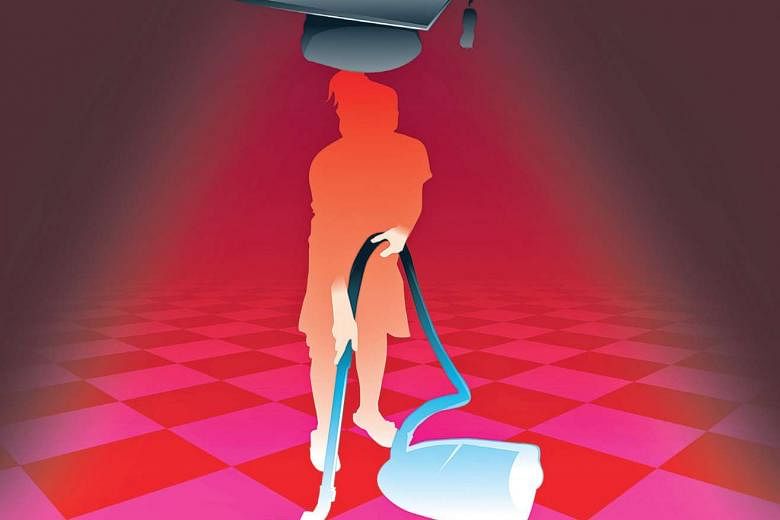It has been more than four years since our maid, Anna, returned to Indonesia.
Since then, there has been a role reversal of sorts. My two older children have had to do more household chores, while Anna has been studying hard in Medan to fulfil her dream of becoming a teacher.
To encourage Anna to work hard, we told her then that we would attend her university graduation ceremony.
Four years passed in a flash, and the invitation to her graduation came last month.
My husband and I, our three children, plus my mother and sister made a trip to Medan to congratulate Anna on graduating from St Thomas University with a degree in English education.
We spent four days there but did not attend the actual ceremony because tickets were limited.
Our 10-year-old son, who was six when Anna left, is the only child who remembers kakak ("elder sister" in Malay). Our seven-year-old daughter, who Anna looked after since she was an infant until she left two years later, remembers only what we told her about kakak.
Anna had not met our youngest, who was born last year.
The older two were hesitant when we first told them about our plans. "Are we really going?" asked the boy.
"I don't even remember her," added my daughter, whom Anna missed the most.
We explained to the children that we wanted to keep a promise, even though it was made four years ago, and even if they no longer remembered much about kakak.
We told them it was also a way of showing gratitude to someone who had helped us tremendously in the past.
For more than two years, Anna cooked, cleaned and helped to look after both of them so I could continue working full time as a journalist.
My mother-in-law would drop by regularly to supervise her.
Anna came to Singapore not knowing how to cook, but returned to Indonesia with an impressive repertoire of dishes.
She enjoyed looking through recipes with me, learning how to cook new ones I found online, and experimenting with various ingredients.
Anna, who broke five milk bottles soon after she came, was not the best at housework.
But I appreciated her willingness to learn and her honesty. She would come to me each time and apologise for breaking the bottles.
But what I cherished the most was her care for my children, without which I would have left my job after giving birth to my daughter.
There are different reasons women come to Singapore to work as maids. And during our trip to Medan, my children learnt that Anna came because she wanted to earn money to study in a university.
She did well for her senior high school but her parents could not afford the university fees.
Salaries in her home town were paltry and it would take her too long to earn enough. So she decided to work as a maid to earn her tuition.
With her savings from working for us for more than two years, she returned to Medan in 2012 and enrolled in university, paying tuition fees of about $850 a year.
After classes each day, she would sell belts in the market to earn money for her daily expenses.
Her savings ran out in her final year and she nearly had to defer her graduation, but she managed to pay her fees after pawning jewellery and borrowing money from her brother.
Over four days in Medan, the children heard the details about her story, her desire to study, her financial struggles and her eventual graduation.
While we were there, we visited her university and took pictures with her in her graduation gown.
We also did some sightseeing. Anna, who is Catholic, took us to Graha Maria Annai Velangkanni, a church that looks like a Hindu temple from the outside.
It was a fascinating sight.
Her graduation was a momentous occasion for her family.
It was the first, and likely the only one, among her siblings.
So it was befitting that we celebrated the occasion with a meal with her family.
Neither her parents nor her four siblings speak English.
But with Anna to translate, we learnt that her eldest brother was worried about her when she came to Singapore in 2010, having heard troubling stories about maids working here.
Her mother shared that Anna still has a photo of my daughter in her bedroom.
The rest of the trip was filled with some supermarket shopping, downtime in the hotel and some fun at the night market for the children.
All in, it was a fruitful trip. We caught up with Anna and she got reacquainted with the children.
I doubt the children will remember much of Medan from our short trip, but I do hope they will remember for a long time that there are people like their kakak, who long to have a shot at studying but have to find ways to overcome their financial difficulties before they can do so.
Sometimes, it takes an outsider to provide a different perspective.
Seeing education as a privilege rather than a chore, and being able to appreciate the opportunities they get, will go a long way to see them through the tough days in school.
This is especially so in the case of my son in Primary 5, whose weekdays are quickly filling up with homework, tests and co-curricular activities.
With a busy training schedule and extra classes, he stays back in school four days a week. But I hope he continues to enjoy all the activities because - as he has realised from our trip - not everyone has the opportunities he has.
Anna said our visit was the "best graduation gift" she received, but I think my children took home something more precious - knowledge that they should not take their education for granted.
- Jane Ng, a former education journalist, is now a freelance writer.


